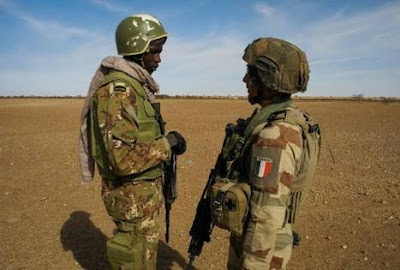Saudi Arabia and the United Arab Emirates are attending a summit in Paris today aimed at accelerating efforts to set up a West African force to battle Jihadists in the Sahel region.
The G5 Sahel – composed of the armies of Mali, Mauritania, Niger, Burkina Faso and Chad – launched a symbolic military operation to mark its creation in October amid growing unrest in the Sahel, whose porous borders are regularly crossed by jihadists, including affiliates of al Qaeda and Islamic State.
However, France, which has some 4,000 troops in the region, has bemoaned that the militants have scored military and symbolic victories in West Africa while the G5 force has struggled to win financing and become operational.
To achieve those ends, French President Emmanuel Macron is hosting among others the leaders of the five participating countries, Germany and Italy as well as the Saudi and Emirati foreign ministers.
Thousands of U.N. peacekeepers, French troops and U.S. military trainers and drone operators have failed so far to stem the growing wave of jihadist violence, leading world powers to pin their hopes on the new force.
“For the last few months, the activity of terrorist groups has not decreased and the armies continue to suffer significant losses, which means that there is an operational urgency to regain control of the region and to increase the military effort,” a French diplomatic source said.
Among efforts to widen support, Macron has pressed Saudi Arabia to take concrete actions to fight Islamist militants and asked Saudi Crown Prince Mohammed bin Salman to contribute to the G5 when he saw him last month.
Macron sees the full implementation of the G5 force as a long-term exit strategy for his own forces that intervened in 2013 to beat back an insurgency in northern Mali.
“The objective is increased military, political and financial mobilization,” the source said, adding that the aim was to get the 5,000-strong force running by March 2018.
Saudi Arabia has now pledged $100 million, a major boost for the force, bringing commitments to more than half the roughly $500 million the G5 Sahel says it needs for its first year of operations. The UAE is also funding a G5 “war school” in Mauritania that is due to open in January.
“Both the UAE and Saudi Arabia are interested in the Sahel. Getting a seat at the table, being seen as security stakeholders, is something that fits in their respective strategy. Both have ambitions in large chunks of Africa,” said Jalel Harchaoui, a geopolitics researcher at Paris 8 University.
Prince Mohammed is also setting up a separate Islamic military coalition, whose member countries can request or offer assistance to each other to fight militants. This could include military help, financial aid, equipment or security expertise.
The Sunni Muslim kingdom is also competing with its main rival, Shi‘ite power Iran, for influence across West Africa and other parts of the Muslim world.



Post A Comment: